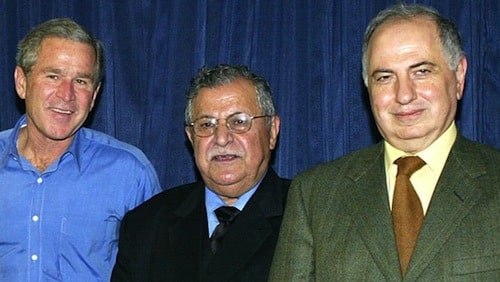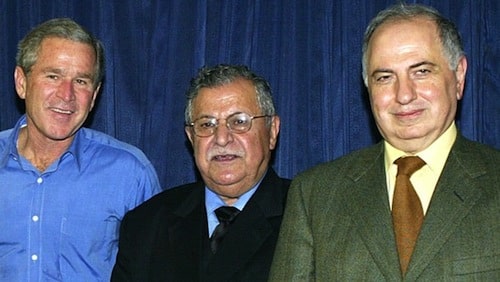Ahmed Chalabi, age 71, has died of a heart attack in Baghdad. As a close observer of his unique role in provoking the Iraq War – a foreign policy and strategic military disaster 12 years ago – I can’t help but look back on that time as an age of innocence. That may sound ironic, but I think it’s true given that many Americans now see that even elections don’t change much.
As painful as it was to watch the US government plunge into the Iraq War based on false WMD warnings – raised in part by Chalabi and his Iraqi National Congress – there was still a sense of hope back then that the truth could be told and the culprits could be held accountable. That seems now to have been a naïve dream.
In 2003, Chalabi was on track to become the new leader of Iraq, just as soon as Paul Wolfowitz’s projected “cakewalk” was finished. Towards this end, he was using, and being used by, the neoconservative cabal of Bush/Cheney appointees in the Pentagon, the National Security Council and the State Department.
Yet, despite the fact that the “cakewalk” turned into a blood-soaked grind – and has now spread disorder across the Middle East and into Europe – many of the same men and a few women are still advising and influencing the Obama administration’s security policies toward Eastern Europe, the Mideast, Russia and China.
Now, as then, this group of neocons and their “liberal interventionist” pals lack the good sense that God gave a chicken. They still march off without a recognizable moral compass (even as they assert their moral superiority) and still without the slightest respect for either the Constitution or the soldiers and marines they gleefully send into harms’ way.
At least with Chalabi, in the early 2000s, the US government had a dapper and hopeful spokesperson for what Iraq was supposed to become. Some saw Chalabi as smooth while others viewed him as oily – a conman with his own checkered past – but he was purported to be the kind of modern Iraqi who could make Iraq a better place.
Chalabi’s optimism, his delusions of grandeur, and his faith in the conspiracy of empire led him to the hubris of the neocons, those vainglorious sorcerers wielding the bureaucratic power of the Pentagon and the White House. Together, they were a perfect match. Chalabi’s fantasies for Iraq were the natural product of his fundamental criminality, but his delusions also were vital to the neocons as they spun their spell to entrance the American public.
Still, Chalabi could be understood as a character in a Edith Wharton novel, trapped in his own era, not overly complex, but certainly earnest. The same cannot be said for the American neoconservatives who used him. Even in his guile there was a sense of guilelessness. After the US invasion of Iraq failed to turn up the promised WMD or confirm Saddam Hussein’s alleged links to Al Qaeda, Chalabi defended the falsehoods, calling himself “a hero in error.”
There was a time when I saw Chalabi as a big part of our foreign policy conundrum, but the past decade has shown us where the real evil lies. Today, I see Chalabi more as a victim of his bad assumptions about the neoconservatives, who privately celebrate the cost, chaos, destruction and decimation of whole countries and cultures, in the name of their twisted vision.
In 2003, the canaries in this dark coal mine were warning about the lies told by President George W. Bush, Vice President Dick Cheney and political appointees throughout Washington to justify an American satrapy in Iraq. While some of us could see a future far grimmer, far more dangerous, and far more destructive than the neocon promises of American soldiers being welcomed by children throwing flowers and candy – many Americans could not. Chalabi was a useful part of why that was.
The warnings from government whistleblowers, knowledgeable observers around the world, and independent-minded journalists and historians were hushed, silenced and buried until Iraq was burning and a quarter of that country’s population had been made refugees by an unwinnable war and a hated occupation.
It took years for the fraud committed by the neoconservatives, their allies in mainstream media, and the Bush administration to sink in, though many Americans still appear confused as to how they should assess what happened. The bottom line is that what occurred was a crime against the American people, the Constitution, international law, the Iraqis and their neighbors. Yet, there has been a stunning lack of accountability for the culprits who perpetrated this crime.
A dozen years after the war began, Chalabi’s promised golden age for Iraq and the Middle East has turned to dross. Today, it is common knowledge that the “word” of the United States is rarely good. Today, the world understands the ambitions of the United States as reptilian rather than republican, driven by a kind of rabid hostility and covetousness that in 2003 most did not easily perceive.
Today, to seek a partnership with the Pentagon or State Department as you try to shape your own small country’s history means you are more gambler than statesman, more fool that patriot.
The actions of the United States in places such as Iraq, Afghanistan, Georgia, Ukraine, Egypt, Libya and Syria – alliances of greed and dependency that Washington has maintained throughout this era – reveal an ugly truth. US foreign policy is not about democracy and self-determination, it is not about hope. Rather, it is about crony capitalism, old-style imperialism, theft and tyranny, all wrapped up in a maelstrom of bureaucratic infighting and budget padding.
No one is trusted in the conduct of America’s never-ending “wars.” Today, when a Russian airliner crashes, the US is as likely to be blamed as a terrorist group, and the terrorist groups themselves are differentiated by their degree of US support and their use of US weaponry – with some Sunni jihadists in Syria now firing US-supplied TOW missiles and being hailed by US politicians as “our guys.”
We’ve come a long way since 9/11 when President Bush said aiding or harboring a terrorist made one as guilty as the terrorist.
Since 2003, many Americans have discovered that their political leadership is addicted to arrogant mayhem. What worked to create public support for foreign wars in 2003 is now laughed at, or ignored, by a cynical citizenry. We have learned to distrust our government, on issues both foreign and domestic.
Chalabi, though his passing has been little noticed and less mourned, reminds us of how US foreign policy with its military adventurism was formed and still is formed. The world that made him a celebrity now faces the cold reality of the widening chaos that is the result of the past dozen years.
We may not see another charlatan like Chalabi soon. One surely can hope that Americans would quickly spot a new Chalabi today and discount the optimistic messaging that he or she is selling. In a troubling way, that is a good thing. These days, the US President no longer even attempts to sell new wars, invasions, occupations and assassinations to the war-exhausted public. He just conducts them in the shadows.
Chalabi’s passing reminds us that we live in a post-heroic world, where the US war machine rumbles along on borrowed money – without a coherent strategy, vision, success or accountability and also without a soul and without heroes. That sad fact is certainly worth a moment of quiet reflection.
Reprinted with permission from LewRockwell.com.


